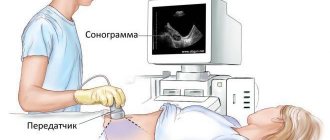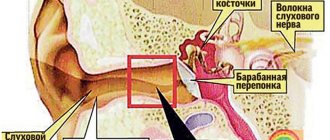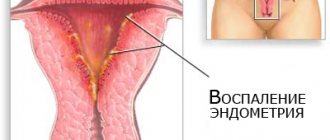Menopause is a pronounced restructuring in the functioning of a woman’s hormonal system, during which the volume of estrogen and progesterone (substances that control the functioning of the reproductive sphere) is gradually depleted. A decrease in the concentration of these hormones in the body leads to the fact that the ovaries empty their reserves, and a woman’s ability to conceive sharply decreases. If this occurs in a woman under thirty-five years of age, doctors enter a diagnosis of early menopause into the patient’s chart.
Causes of delayed menstrual flow
- The main reason for a delay in menstruation during menopause is a change in hormonal levels in the body. Involutional processes occurring in the area of the central sections of the hypothalamus contribute to a gradual decrease in the level of sensitivity of this section of the pituitary gland to estrogenic influences in the body. And this is a violation of the regulatory functionality of the hypothalamus in the flow of reverse regulatory processes.
An insufficient level of stimulation on the pituitary gland leads to an increase in the level of production of follicle-stimulating and luteinizing hormones, which, in turn, leads to anovulatory cycles that are not accompanied by the release of an egg.
- These processes provoke the onset of the development of specific processes in the ovarian region, characterized by atresia of the follicles, destruction of the encapsulated membrane, death of the oocyte and preservation of only the stroma, which contribute to a reduction in the level of estrogen secretion. This in turn contributes to a pathological change in feedback from the hypothalamus and the manifestation of even greater pathological changes.
As a result of the processes described above, the level of hormonal substances in the body changes. Along with this, their sequence in alternation before the onset of the next menstrual cycle also changes, which leads to the fact that menstruation is delayed, and then menopause occurs. It is these reasons for hormonal changes in the body that lead to a delay in menstruation at the beginning of menopause.
Treatment
Therapy for early menopause is aimed at restoring normal hormonal levels:
- Hormone replacement treatment (HRT). Combined oral contraceptives (Diane-35, Anzhelik, Femoston) with a 7-day break or drugs for the treatment of menopause in a continuous mode (Cliogest, Cyclo-Proginova) are successful. Treatment with hormones is prescribed taking into account contraindications (tumors of the female genital area, mammary glands, pathology of the liver, kidneys and others). It is possible to prescribe gestagens (Duphaston), combinations of estrogens with gestagens.
- Herbal medicine. Used in patients who have contraindications to HRT. Prescribed drugs: Klimadinon, Remens, Klimara, created from plants that have estrogen-like effects.
- Local treatment with estrogens. Indicated in the presence of involutive processes in the cervical canal, vagina, perineum. Suppositories, ointments, and creams with estrogen are used.
- Sedatives and sedatives. They help normalize the patient’s emotional state and improve sleep (motherwort, valerian, teas with chamomile, mint, in difficult cases, weak tranquilizers, for example, tazepam).
- Vitamins, minerals to improve general condition and strengthen the immune system.
- Calcium preparations. To prevent osteoporosis: calcemin, calcium-D3-nycomed, calcium-active citrate.
Body changes during menopause
At the turn of the 40th birthday, a woman’s body may increasingly lack menstrual-type blood discharge. Such a lack of menstruation indicates the onset of menopause. And the older a woman gets, the more often the absence of menstruation manifests itself, and the reproductive system of organs increasingly loses its reproductive functionality.
But despite the fact that the functioning of the endocrine glands is reduced, and sex hormones are produced in ever smaller quantities, the processes of ovulation and maturation of an egg ready for fertilization still rarely occur.
Therefore, the cause of the delay may be the onset of pregnancy, and menopause and its manifestations may hide the presence of this factor.
Therefore, it is necessary to be attentive to your health status and the symptoms that appear.
It is recommended that in cases where there is no menstruation for two or more weeks, and changes are observed at the psycho-emotional level, a pregnancy test is performed. If the result is negative, you must contact a medical center to determine a further treatment regimen for the upcoming menopause.
Menopause is a fairly long transition to old age, which is divided into three main phases:
Let's take a closer look at the signs that contribute to the onset of menopause.
FSH test
Having considered the symptoms described above, it is impossible to say unequivocally whether their cause is pregnancy or menopause. How to finally dispel oppressive doubts?
The most informative diagnostic method can be a rapid test to determine the level of follicle-stimulating hormone (FSH). Its increased content is characteristic of the onset of menopause. When conception occurs, the test will show a reduced concentration of FSH, because Stimulating the ovaries by the pituitary gland has no physiological meaning. To obtain reliable information, the test should be performed twice with an interval of 7-10 days.
But the surest action to give an accurate answer to the question of how to distinguish menopause from pregnancy is to visit a doctor and undergo a series of examinations. Based on the results obtained, it is possible to draw reasonable conclusions about the reasons that provoked the malaise.
Signs
Among the first signs indicating the onset of menopausal changes in the body are a delay in menstrual bleeding. During menopause, menstruation is usually delayed first by 6-7 days, then by a month to a month and a half, and may not appear for longer. Blood discharge during menstruation significantly decreases in quantitative volume, becoming increasingly scarce. Such symptoms become more noticeable during the premenopausal phase.
The onset of menopause, along with the lack of timely bleeding, may be accompanied by other pathological symptoms, united into one scheme that characterizes the entire process of menopausal changes. These manifestations are divided into the following groups:
- disorders at the psycho-emotional level of the state of the central nervous system, including such manifestations as increased irritability, apathy, tearfulness, frequent depressive states and various phobias;
- endocrine changes, manifested in the form of dysfunction of the thyroid and pancreas, as well as the adrenal glands, causing chronic weakness, lethargy, pathological changes in the joints and active gain of extra pounds;
- changes in the functionality of the cardiovascular system, accompanied by the appearance of headaches, hot flashes and attacks of sudden heat, dizziness and increased sweating.
All groups of symptomatic manifestations of menopause have a pathogenic effect on the female body. This is another reason for delayed menstrual flow.
The onset of menopause in the female body, in most cases, occurs at the turn of the 50th birthday. This period is accompanied by a complete cessation of the menstrual cycle and the extinction of the reproductive functionality of the genital organs. With the onset of menopause, the occurrence of an unplanned pregnancy becomes impossible.
But until menopause has occurred, it is recommended to use effective methods of contraception to prevent unplanned fertilization of the egg and its further development.
Let's take a closer look at the main features of the menstrual cycle in various phases of menopause.
Delayed menstruation in the premenopausal period
Pathological changes in the nature of menstrual flow and the manifestation of delays in the premenopausal period begin to appear after 43-44 years and can last for 5-7 years.
During the entire period of menopause, the menstrual cycle is characterized by periodic cessation of menstrual-like discharge and the resumption of the menstrual cycle, with changes in the psycho-emotional state of the woman. Delays in menstrual flow during this period become increasingly longer, turning into symptoms corresponding to the menopausal period.
Menstruation in menopause
At the onset of menopause, the absence of menstrual flow reaches its peak duration of 12 months or more. With the onset of menopause, the menstrual cycle stops completely and periods will no longer appear.
During a year or more of absence of menstrual flow, ovulation processes in the ovaries also stop, which leads to a full transition to menopause itself. From the moment of menopause, the female body begins to prepare for the transition to the next stage of the menopause – postmenopause.
Menstrual flow in postmenopause
If, with the onset of postmenopause, rare bloody discharges have not yet stopped appearing in a woman’s body, this may indicate the development of serious pathological processes that are dangerous for the entire female body.
If such symptoms appear in postmenopause, it is recommended to immediately seek the advice of a qualified medical specialist and undergo the necessary examination to identify the cause of the bleeding.
Sex and menopause4
Decreased libido, irritability, dryness and burning of mucous membranes, discomfort during sexual intercourse are typical symptoms of menopause. However, sexual relations are necessary to maintain women's health during this period. sexual intercourse improves blood circulation in the reproductive organs, ensures the release of pleasure hormones, helps cope with depression and maintain fertility, which is especially important if early menopause is observed.
With the decline of ovarian function, the pH balance in the vagina gradually shifts towards more alkaline, depriving the body of local protection and opening the way for bacteria. That is why it is important for a woman to use intimate hygiene products that help bring the pH balance to a normal acidic state. Hygienic procedures for the genitals using ordinary soap or gel are unacceptable in this situation. Such products with an alkaline composition can significantly increase vaginal dryness. Special gels and foams for women's intimate hygiene, as a rule, contain lactic acid - a mild moisturizing and acidifying ingredient that is optimally suited for this purpose.
Topically applied products - gels for intimate hygiene, special creams and ointments that moisturize mucous membranes - will help to avoid discomfort, dryness and burning during sexual intercourse. Some of them contain a hormonal component to provide additional support to the body of women experiencing early menopause.
From the inside, most of the unpleasant symptoms of menopause can be neutralized by taking hormonal medications or birth control pills. Hormone therapy is a responsible procedure that should only be performed under the supervision of a specialist. A qualified doctor must carefully study the woman’s data, conduct the necessary research, and, based on the information received, prescribe a specific drug, dose and regimen.8
Types of delayed menstrual flow
Cases with the manifestation of delayed menstrual flow, characterized by a sign of approaching menopause, can occur with varying intensity and nature of the flow. Based on this, the following types of delayed menstrual flow are distinguished:
- Irregularity of menstrual flow, occurring with a gradual increase in duration and decrease in the volume of menstruation. With this course of delays, a gradual decline in the body’s menstrual ability is observed, moreover, periods become more scanty with a smooth transition to the cessation of their manifestations. This functionality of the reproductive system is considered normal and manifests itself in most cases.
- Delays with disturbances in the regular cyclicity of the menstrual cycle, characterized by manifestation over a longer period of time, but affecting different time periods. There are hormonal surges that affect the nature of menstruation, which can be either too scanty or too heavy. In this case, it is recommended to seek qualified medical help.
- Delayed menstruation, which appeared once and led to the complete cessation of menstruation and the extinction of the reproductive capacity of the female body. This is a fairly rare phenomenon that requires specialist supervision.
The menopausal stage and the cessation of menstrual function in the body is a kind of stress for a woman. Therefore, in order to avoid serious consequences, it is necessary to prepare for the onset of this period in advance by studying all the available literature in order to meet hormonal changes in your body at a decent level and promptly apply the acquired knowledge to alleviate your own well-being.
It is also recommended that before the onset of menopausal changes, try to lose extra pounds, which will facilitate an easier transition of the body into the next stage of life.
Interesting and educational video on this topic:
Menopause is a physiological process that every woman experiences from 40 to 60 years old. This range in age is associated with the individual characteristics of the body, living conditions, genetic predisposition and other factors.
A woman’s purpose is procreation, motherhood; it is inherent in nature that at a certain period the reproductive function begins to gradually fade away.
Hormones play a leading role here; it is with a decrease in the production of female sex hormones in the ovaries (estrogens, estradiol) that a radical restructuring of the female body occurs. It is called menopause or menopause and brings a lot of inconvenience and anxiety to the weaker sex. This period is accompanied by certain symptoms.
How long does the ability to conceive last?
The female reproductive system is capable of conceiving and carrying a child until the follicle and egg are formed. The same period is accompanied by increased production of female hormones, which prepare the uterus so that it can accept a fertilized egg. Menopause is characterized by a decline in the activity of the organs of the reproductive system, which gradually makes conception impossible. However, this process stretches over years and begins in women of different ages.
According to statistics, the onset of menopause is recorded around 45-50 years of age. During this period, the production of hormones is reduced, the work of the ovaries slows down, and germ cells are produced in much smaller numbers, but you can still get pregnant during menopause.
What is menopause and its phases
Menopause is not a disease, but the beginning of the attenuation of characteristic female characteristics, an indicator that the possibility of new motherhood is becoming less and less. Restructuring the body in a new way affects all systems and organs.
This process lasts for more than a year and goes through 3 stages.:
- The first is called perimenopause . Around the age of forty, the level of estrogen in the blood begins to decrease. This leads to destabilization of the menstrual cycle: its frequency, duration, and intensity of discharge changes.
- Menopause is the second period, it begins with the complete cessation of menstruation, its duration is usually considered to be a year. This is the most difficult time for a woman, when the restructuring is quite intense, and she has to adapt to new sensations.
- Postmenopause . It occurs one year after the last menstruation. The level of estrogen at the beginning is half the original level, and their production stops completely. This phase is characterized by a restructuring of the endocrine system, so you should be wary of pathologies of the thyroid gland and associated disorders of the cardiovascular system.
How not to grow old during menopause, read here.
Pregnancy or menopause?
As a rule, the cessation of menstruation, supplemented by the accompanying signs of menopausal syndrome, is inextricably linked with the idea that it is now impossible to conceive a child. During this period, a woman experiences conflicting feelings: on the one hand, she is afraid of the upcoming changes, and on the other, she is involuntarily pleased by the fact that she will no longer have to worry about the occurrence of an unwanted pregnancy. But is it really that simple? Are menopause and pregnancy really incomparable phenomena? How to recognize the onset of conception, if it is possible? And what challenges does late motherhood present? Let's look at each of these issues in more detail.
When and how does it occur in women?
There are no strict time criteria for the onset of menopause, as for any physiological process. For some ladies, the process of restructuring goes almost unnoticed, while others suffer from its painful symptoms. In many ways, the moment of menopause is determined by hereditary factors. It is generally accepted that on average it occurs by age 50. But recently this process has become known, so it is important to know how to determine it.
There is a theory that the onset of menopause is predetermined during the period of intrauterine development . A certain number of eggs are laid in the ovaries of a developing girl. They are consumed during her reproductive period. Some, maturing monthly, leave the ovarian follicle, and some die for physiological reasons before reaching maturity. But their numbers are decreasing year by year. And when reserves are depleted, menopause occurs.
The follicle acts as a kind of egg bank. During the reproductive period, it manages to mature 300-500 oocytes ready for fertilization.
What affects the start time
The onset of menopause in women is usually observed between the ages of 45 and 50 years. It happens that the onset of hormonal changes occurs earlier, for example at 43-44 years, or later.
Most often, this circumstance is not a pathology; rather, it is associated with a genetic predisposition. As a rule, the onset of menopause occurs at the same age at which it occurred in women according to their pedigree - mother, grandmother.
But the cause of early or late onset of menopause is not always heredity.
The cause of the pathological development of menopause may be other factors, for example:
- illness;
- disruption of internal organs;
- operations.
Causes of early and late menopause
Early menopause is considered to be the manifestation of menopausal symptoms before the age of forty . The causes of this phenomenon can be hereditary and acquired. The first category includes various chromosomal pathologies. The acquired factors are very different in nature.
Also read about the symptoms of menopause after 40 years here.
Among them:
- Hormonal pathologies of the thyroid gland, metabolic processes (diabetes mellitus, obesity) and others.
- Gynecological diseases and the consequences of their treatment (chemotherapy, surgery, etc.).
- Numerous abortions.
- Unqualified hormonal contraception.
- Bad habits (smoking, alcohol, etc.).
- Oncological diseases.
- Postponed surgeries.
- Violations of work, rest and nutrition regimes.
- Unfavorable climatic or environmental conditions.
- Stress.
It, like early menopause, is often genetically predisposed. But this is not always a good thing for a woman.
Pathological causes of late menopause may be:
- Gynecological diseases (uterine fibroids, ovarian dysfunction).
- Some types of tumors are characterized by high levels of estrogen in the blood, as a result of which menstruation does not stop for a long time.
- Previous gynecological operations using chemotherapy or radiation.
- Long-term treatment with antibiotics or other drugs that affect reproduction.
Features of pregnancy during menopause
But what if, in the dispute between the symptoms of menopause and pregnancy, the latter won? Such news can shock much more than all the manifestations of pathological menopause taken together. Conceiving in adulthood sometimes becomes a real stress, because thoughts about motherhood, as a rule, no longer come to mind, moreover, the woman is determined to complete her reproductive activity. And here's a surprise...
The decision to keep the child can only be made by the woman herself. The development of medicine makes it possible to create a favorable atmosphere for bearing and giving birth to a healthy baby. However, it should be borne in mind that late pregnancy is fraught with some unpleasant features:
- When deciding to give birth after 40 years, you should remember that there is a certain risk of having a baby with pathologies. One of these dangerous manifestations is the presence of chromosomal abnormalities in the fetus, leading to the development of Down syndrome;
- Late pregnancy is often much more difficult to bear. It puts additional stress on all organs and systems, the functioning of which is already burdened by menopausal and age-related changes. Often the body works to the limit to preserve the fetus;
- Pregnancy with the onset of menostasis is a huge hormonal shock for the body, all reproductive processes are already directed towards rest, and an unplanned pregnancy becomes a kind of shock, forcing the endocrine and reproductive systems to work at full capacity, which can become a catalyst for pathological processes, including tumors . In addition, to preserve the fetus, it is often necessary to resort to hormone replacement therapy, which, of course, is also not always safe.
Every woman entering menopause must take full responsibility for her health in order to prevent undesirable consequences that could significantly worsen her health. An unstable menstrual cycle is not a reason to ignore contraception. Only the onset of menopause, confirmed by a medical examination, can serve as a reason for stopping birth control, unless, of course, motherhood is not part of the woman’s conscious plans.
Harbingers
The first harbingers of the onset of menopause appear long before its onset. As a rule, women do not notice them. This is especially true for those who at the age of 30-40 suffered gynecological diseases (endometriosis), had problems with conception or pregnancy and childbirth.
The first sign of premenopause - instability of the menstrual cycle - in the modern world is increasingly lost against the background of many years of irregular periods in women of childbearing age . Changes in the duration of menstruation, intensity of bleeding, missed periods and others that are characteristic of precursors are difficult to distinguish from signs of dysfunctional disorders occurring in them. They are associated with stress, unfavorable ecology, frequent abortions and the not always justified use of hormonal drugs.
The onset of hormonal changes can be manifested by periods of shortening of the menstrual cycle to two to three weeks. And alternating missed periods result in bleeding. Over time, these pauses become more frequent.
In the early stages of menopause, PMS often worsens due to hormonal imbalance. At the same time, mood swings become more frequent, which can lead to depression.
Also read why basal temperature changes during menopause.
A decrease in estrogen levels also affects sex life. These ubiquitous hormones also control the hydration of the vaginal mucosa and the production of lubricant to reduce friction during intimacy. When this does not happen in time, discomfort, dryness in the intimate area and decreased interest in intimate relationships appear.
When is childbirth possible?
Childbirth is possible if the woman’s body does not undergo age-related changes that are typical for the majority. But doctors strongly recommend that you carefully consider this issue, because late pregnancy carries a great risk for both the child and the mother. After 40 years, with the onset of menopause, all diseases occur in a quiet form, which the woman did not even suspect about. There are disturbances in the functioning of the cardiovascular system, which affects the development of the baby. There is a high probability of giving birth to a child with Down syndrome or congenital diabetes.
According to statistics, about 50% of pregnancies during menopause spontaneously terminate after the 20th week.
If a woman becomes pregnant at 50 years old, she will not be able to give birth on her own, so she will have a caesarean section. However, at this age, experts recommend terminating the pregnancy for the reason that the fetus will experience developmental delay due to the poor quality of the woman’s blood.
Childbirth during menopause plunges a woman into a state of depression, and she will not experience the joy of motherhood. For the next 15-20 years, a woman must be active and take care of her health in order to raise her child.
Childbirth is usually by caesarean section
How to recognize?
Summarizing what was said earlier, we can understand that the beginning of menopause is considered to be premenopause. This process, which takes more than a year, is characterized by increasing pauses between menstruation, bleeding after them and scanty discharge during menstruation.
This is considered normal. But at the beginning of menopause, pathological disorders are also possible when estrogens, on the contrary, are produced intensively. This anxiety syndrome is called hyperestragenia. In this case, menstruation becomes heavier and longer, and bleeding is also common. The mammary glands become enlarged, hardened, and touching them causes pain. During a medical examination, fibroids and thickening of the uterine walls are detected.
Symptoms
Signs of menopause are divided into early and late. The earliest of them have already been mentioned.
It is also typical for her:
- Dizziness, blood pressure changes, tachycardia, weakness.
- Nausea, swelling, joint pain;
- Pain in the lower abdomen;
- Hair loss, deterioration of skin and nails;
- The appearance of an unpleasant body odor;
- Insomnia, anxiety, emotional imbalance. (Hysteria, translated from ancient Greek means “womb”)
- Drowsiness and depression.
Late manifestations of menopause include various pathologies and diseases due to hormonal disorders. At risk are the cardiovascular, endocrine and skeletal systems, genitals, metabolic processes, skin and other organs and systems.
Is it possible to pause the start and how?
Manifestations of early menopause are a consequence of ovarian dysfunction. If its causes are not hereditary abnormalities that are difficult to correct, then in many cases hormone replacement therapy comes to the rescue . It is also effective for the prevention and suspension of many diseases of the reproductive system.
A rational, healthy and regular diet is very important.
We should not neglect proven folk remedies and herbal medicine. So, ginger can delay menopause. Strengthening and physical exercises, regular walking, and walks in the fresh air increase immunity, and therefore help strengthen the body in the fight against premature aging.
From the above, conclusions arise:
- Menopause is a physiological process, and there is no need to be afraid of it. It lasts for several years.
- The main role in it is played by hormonal changes and a decrease in estrogen production.
- The time of its onset and course are always individual, but it is unacceptable to ignore early menopause.
- Menopausal manifestations can be recognized by characteristic symptoms.
- To avoid early aging, you need to monitor your health, do not neglect physical activity and do not skip preventive examinations with a doctor.
Consequences of early menopause
Premature menopausal changes are far from understood by normal and natural female physiology. After all, the consequences of early menopause are premature aging and infertility. In addition, menopausal processes threaten problems with the psycho-emotional and physical health of women. Early decline of reproductive function is dangerous due to the following manifestations:
- sudden mood swings, apathy, anxiety;
- aging skin, nails and hair;
- low sex drive;
- the appearance of heart pain and shortness of breath;
- musculoskeletal disorders and bone fragility.
If you notice symptoms of early menopause, be sure to visit a doctor to find out the cause and begin treatment for such an anomaly.
Main symptoms of menopause
Basically, the first signs of menopause in women are observed at 45-55, but there are cases of early menopause. Premature cessation of reproductive function is more difficult to bear than when the symptoms of menopause first appear in women after 50 years of age. The menopause is characterized by a gradual decrease in the mass and volume of the ovaries; menstruation becomes irregular during menopause.
No one has managed to avoid this, so you need to know how menopause begins.
Menstrual cycle during menopause
The symptoms of menopause are different for everyone, but any woman with age experiences a decrease in the production of sex hormones and, as a consequence, reproductive function. The decline of reproductive function leads to the fact that menstruation during menopause becomes different from what it used to be. A delay in menstruation during menopause is characteristic precisely for its onset.
There are several types of delay:
- Delayed menstruation during menopause develops gradually. Bleeding becomes less profuse and its duration is reduced. This indicates healthy functioning of the body. Some women are concerned: “Is it possible to get pregnant during menopause?” It can take from 12 to 24 months before the complete decline of reproductive function after the last menstruation; therefore, you can get pregnant during menopause. It is better to contact a gynecologist to select contraceptive methods.
- During menopause, menstruation becomes irregular, the length of the cycle varies, and the bleeding itself differs in intensity each time. This indicates a clear hormonal imbalance and requires consultation with a specialist.
- Menstruation during menopause may disappear for a long period of time, for example, for three months, and then spotting is observed, which disappears for a long period. Such periods during menopause indicate a surge in hormones and a sharp onset of menopause.
- Some women experience a one-time delay in menstruation, after which the cycle stops completely. That is, menstruation does not return during menopause.
Tips for menopause after 40 years
It is necessary to carefully monitor your own weight and maintain it at the required level using:
- moderate nutrition with limited animal fats;
- carbohydrates;
- salts;
- alcoholic substances.
A sharp change in weight in any direction is unacceptable, both before 40 and after 44. It is important to stabilize the functioning of the intestines. Therefore, it is advisable to remember about dried fruits, which include dried apricots, raisins and prunes.
Those women who smoke should give up this “killer” habit as quickly as possible.
It is mandatory to:
- undergo a gynecological examination;
- then take a smear test;
- carry out an ultrasound examination to determine the condition of the reproductive organs. Regardless of whether there are any symptoms during menopause or not.
It is advisable to do gymnastic exercises, therapeutic physical education, and walking as often as possible, for 30 minutes five times a week. Practice massage treatments at least twice a year.
It is recommended to discuss the research results with a specialist and how necessary it is to take additional measures after the main treatment, namely hormone replacement therapy, during the period of restructuring of all body systems.
How long does the menopause last?
It is difficult to say how long menopause lasts; much depends on the individual characteristics of the body, as well as on heredity. Often, at what age and how long the mother’s menopause lasted, her daughter will also have it.
But in many ways, how long menopause lasts will depend on the woman herself. If she leads an active lifestyle, is self-confident, optimistic, adheres to a balanced diet, takes multivitamins, and gets enough sleep, then this stage in her life will go easier.











